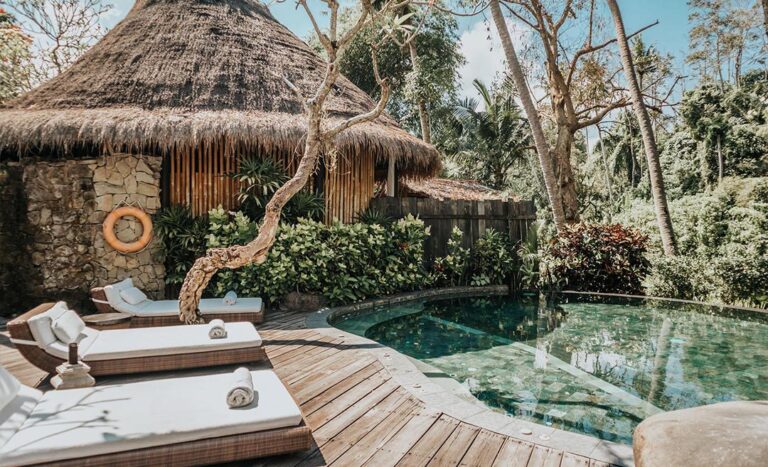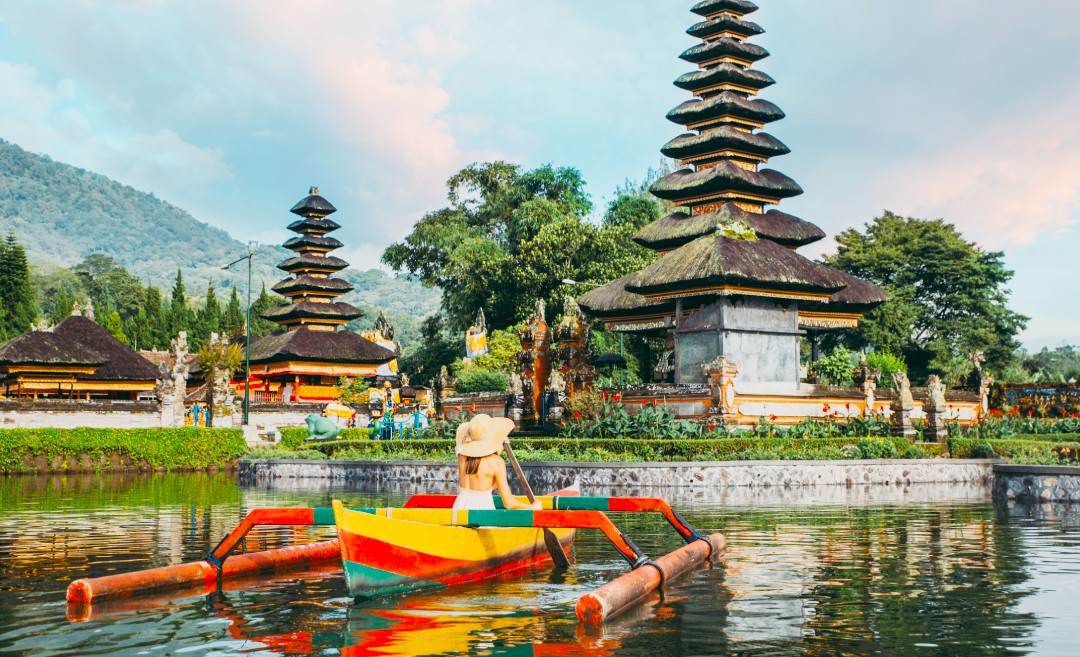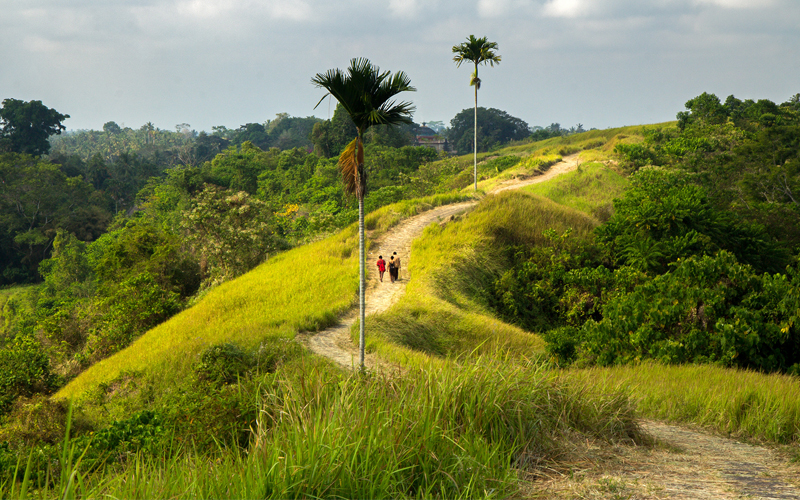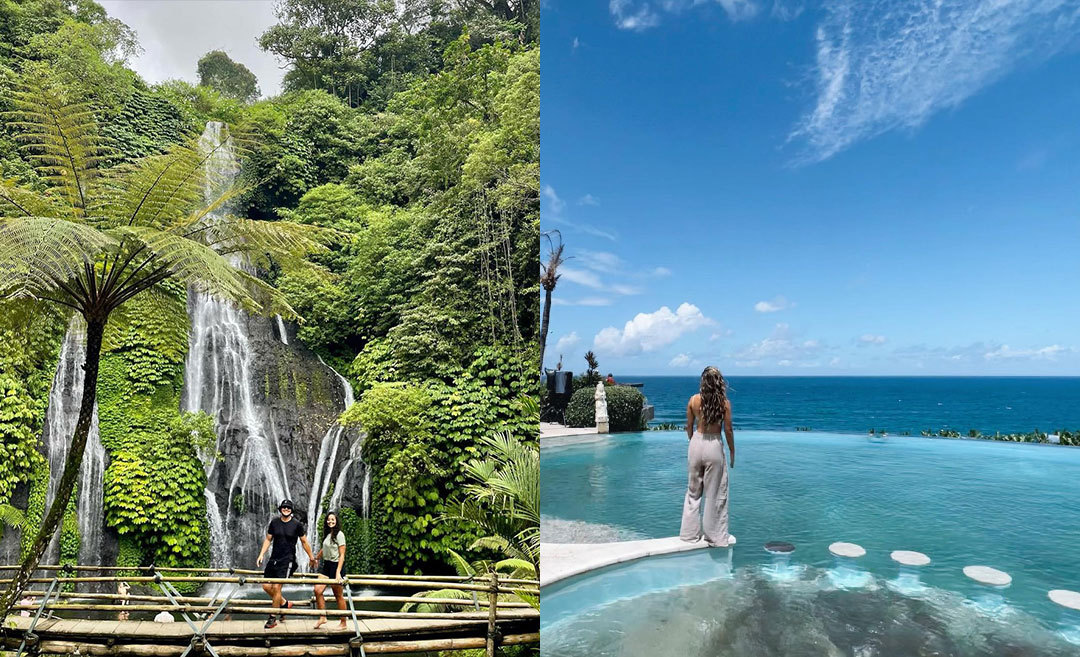Bali, renowned for its stunning beaches, lush landscapes and vibrant culture, has long been a popular destination with travellers worldwide.
However, Indonesia’s Island of the Gods is increasingly grappling with the consequences of overtourism, which threatens its natural beauty and local communities.
In response to these challenges, a growing number of eco-friendly hotels are emerging in Bali. These green options provide luxurious stays and prioritise sustainability, aiming to minimise their environmental impact and promote responsible tourism.
1. Desa Potato Head Suites and Studios
It’s difficult to miss the eye-catching facade crafted out of old window shutters salvaged from across Indonesia as you enter Desa Potato Head Suites and Studios.
At the resort’s Creative Lab, waste such as plastic packaging films, PVC pipes, and polystyrene foam collected from across the island are reimagined into furniture and artwork.
Its upcycling initiatives extend to in-room amenities, including candles crafted from waste cooking oil and soap dispensers made from polystyrene foam and oyster shells, which received global recognition at Milan Design Week in 2023.
Desa Potato Head also has a community project centred around regenerative farming, with two syntropic farms established in West Bali, helping to provide food and job opportunities for the locals. The resort’s in-house restaurants also utilise ingredients sourced from these farms.
This trendy resort in the tourist hub of Seminyak also routinely organises beach cleanups and Follow The Waste tours, where guests are taken on a behind-the-scenes look at the resort’s waste management process.
Address: Jl. Petitenget No.51B, Seminyak, Kec. Kuta Utara, Kabupaten Badung, Bali 80361, Indonesia
Contact: +62 361 620 7979
2. Suarga Padang Padang
Suarga Padang Padang is an eco-friendly haven located on the cliffs overlooking Padang Padang Beach, about a 15-minute drive from Uluwatu.
The boutique resort boasts 36 elegant rooms, pavilions, and villas designed to blend in with the existing landscape – many structures within the resort are elevated on stilts to preserve the indigenous flora and fauna.
These structures are predominantly made from bamboo and reclaimed wood sourced from abandoned ironwood pontoons, dismantled teak houses, and old factories across Indonesia.
The resort’s lobby, public areas, and bathrooms are crafted from natural stone hand-picked by locals on Sumba Island, showcasing its support for local communities and traditional craftsmanship.
The accommodations feature vaulted ceilings and are constructed with alang-alang, a grass native to Bali, and bamboo to promote natural air circulation, significantly reducing the need for artificial cooling.
You can also embark on a gastronomic adventure at the Dugong in-house restaurant, where dishes are prepared with locally grown ingredients sourced from within a 50-kilometre radius of the resort.
Address: JL. Pantai Labuan Sait, Br Dinas Labuan Sait, Pecatu, Kec. Kuta Sel., Kabupaten Badung, Bali 80361, Indonesia
Contact: +62 811 399 1199
3. Buahan, a Banyan Tree Escape
Designed to immerse guests in nature through its unique Naked Experience concept, Buahan features 16 opulent villas with no walls or doors, with only thin curtains providing privacy.
Guests can learn about the resort’s zero-waste, farm-to-table concept, which combines local sourcing and heritage techniques in the preparation of its food and drink.
The menu at Buahan is 70 percent plant-based, with all ingredients sourced from within an hour’s drive of the property. This approach not only supports local farmers but also reduces the resort’s carbon footprint.
Meanwhile, the in-house Botanist Bar also highlights the use of locally grown ingredients and botanicals in its beverages. A standout cocktail is the Koffie Martini, made of leftover ground coffee, highlighting the resort’s commitment to minimising waste.
Located in Ubud‘s Gianyar neighbourhood, this adults-only resort underscores its dedication to sustainability in using repurposed Bornean ironwood. Sourced from Kalimantan, this material is traditionally used for fishing boat decks and boat piers due to its resistance to insects and wood borers.
Address: Jl, Buahan Kaja, Kec. Payangan, Kabupaten Gianyar, Bali 80572, Indonesia
Contact: +62 361 620 8181
4. Desa Hay
Social responsibility is at the heart of Desa Hay’s operations. The eco-resort employs local staff and contractors and supports local children through a scholarship fund.
Located in Canggu, this adults-only resort supports local organisations such as the IDEP Foundation, which aids community education and sponsors school fees for local orphans.
Additionally, to pay it forward, the resort organises workshops, events, and training modules to equip local operators and developers with the skills and insights needed for sustainable building and operations.
The resort’s six elegant villas, set within lush private gardens, are designed to minimise environmental impact. In addition to the use of energy-efficient LED lighting and energy switches, the villas are also powered by the resort’s 105 solar panels.
Guests can enjoy toiletries made from bamboo, such as toothbrushes and combs, as well as biodegradable slippers crafted from coconut husks. The resort’s water supply is also purified on-site, allowing guests to drink water straight from the tap.
Address: Jl. Raya Tumbakbayuh – Pererenan, Canggu, Kec. Mengwi, Kabupaten Badung, Bali 80361, Indonesia
Contact: +62 877 8090 2669
5. Fivelements Retreat Bali
It’s no surprise why Fivelements Retreat Bali is among the top green hotels in Southeast Asia. Located on the banks of the Ayung River, the buildings at this wellness retreat are designed to maximise passive cooling, significantly reducing reliance on air-conditioning.
Constructed with natural materials such as bamboo, rattan, local stone, recycled timber and coconut wood, they enhance the retreat’s aesthetic appeal while ensuring harmony with its natural surroundings.
Here, sustainability goes beyond green building standards and into the realm of regenerative design. This involves not only reducing the resort’s impact on nature but also working actively to regenerate the environment and enhance the well-being of locals through its operations.
Energy conservation is a cornerstone of Fivelements’ operations. The hotel employs low-voltage LEDs, reducing electricity consumption for lighting by 95 percent.
Water conservation and management are crucial at Fivelements. Wastewater is treated on-site to meet international standards, and the retreat also recycles rainwater to minimise its environmental impact.
Address: Mambal, Abiansemal, Badung Regency, Bali 80352, Indonesia
Contact: +62 361 469 206
6. Alila Manggis
Alila Manggis is renowned for its robust green initiatives, particularly its coral conservation programme in partnership with local dive resort Zen Dive Bali. This programme includes weekly site visits to maintain an underwater garden, monitor coral growth, and plant new corals each month.
Additionally, Alila Manggis organises beach and underwater cleanups on the 28th of each month. These events begin with an interactive presentation educating participants on the importance of marine conservation and the role of debris databases in tracking and mitigating ocean pollution.
Located in East Bali, strategically between the coast and Mount Agung, the resort’s sustainability efforts are not limited to marine conservation. Alila Manggis also composts its green waste and separates garbage in-house to minimise waste.
Additionally, Alila Manggis works with the residents of nearby Buitan village to develop a green bank programme, which helps them effectively dispose of their dry waste for recycling or reuse.
These comprehensive green practices earned Alila Manggis the prestigious EarthCheck Gold certification in 2016 in recognition of its exceptional environmental and social responsibilities.
Address: Desa Buitan, Manggis, Karangasem Regency, Bali 80871, Indonesia
Contact: +62 363 41011
This story by Gregory Basil was originally published on AirAsia. Zafigo republished this story in full with permission from the publisher, simply because good stories should be read by as many people as possible! If you have stories that will be of interest and useful to women travellers, especially in Asia, please get in touch with us at [email protected].



